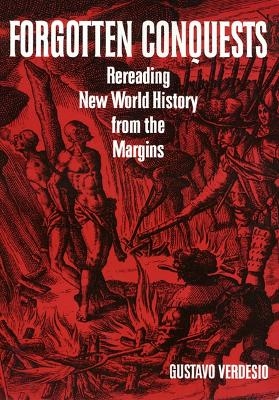
Forgotten Conquests
Rereading New World History from the Margins
Seiten
2001
Temple University Press,U.S. (Verlag)
978-1-56639-834-3 (ISBN)
Temple University Press,U.S. (Verlag)
978-1-56639-834-3 (ISBN)
- Titel z.Zt. nicht lieferbar
- Versandkostenfrei
- Auch auf Rechnung
- Artikel merken
The heroic texts depicting the discovery of territories, and the ultimate subjection of land and cultures to European nation-states all but erase the vanquished. This work lays bare the discursive strategies that generated the founding texts of Latin American history and engulfed its subjected peoples in silence for 500 years.
Borrowing from the old adage, we might say that to the victor belongs the history. One of the privileges gained in colonizing the New World was the power to tell the definitive stories of the struggle. The heroic texts depicting the discovery of territories, early encounters with indigenous peoples, and the ultimate subjection of land and cultures to European nation-states all but erase the vanquished. In Forgotten Conquests, Gustavo Verdesio argues that these master narratives represent only one of many possible histories and suggests a way of reading them in order to discover the colonial subjects who did not produce documents. Verdesio read the key texts relating to the struggles for possession of River Plate's northern shore -- present-day Uruguay. He probes them for traces of conflicts in meaning and the agency of Amerindians, gauchos, Africans, and women -- the subjected peoples that the texts try to silence. The narrators, speaking for their culture, assume the role of knowing subject, repressing all other voices, epistemologies, and acts of resistance.
Verdesio's tasks are to listen for those that the Europeans represented as an unintelligible Other, to draw them into the foreground, and to decolonize their histories. By unpacking these texts, Verdesio shows that from the European point of view, the colonial encounter draws the New World into historical time and ushers in a new concept of knowledge. For the first time, the historian's role is to discover, to interpret eyewitness testimonies and first-hand experience, to write 'a new history of admirable things.' Even in this reconstruction of historical truth, Old World ideology drives the narratives, whose chief purpose is to justify conquest. Forgotten Conquests lays bare the discursive strategies that generated the founding texts of Latin American history and engulfed its subjected peoples in silence for 500 years.
Borrowing from the old adage, we might say that to the victor belongs the history. One of the privileges gained in colonizing the New World was the power to tell the definitive stories of the struggle. The heroic texts depicting the discovery of territories, early encounters with indigenous peoples, and the ultimate subjection of land and cultures to European nation-states all but erase the vanquished. In Forgotten Conquests, Gustavo Verdesio argues that these master narratives represent only one of many possible histories and suggests a way of reading them in order to discover the colonial subjects who did not produce documents. Verdesio read the key texts relating to the struggles for possession of River Plate's northern shore -- present-day Uruguay. He probes them for traces of conflicts in meaning and the agency of Amerindians, gauchos, Africans, and women -- the subjected peoples that the texts try to silence. The narrators, speaking for their culture, assume the role of knowing subject, repressing all other voices, epistemologies, and acts of resistance.
Verdesio's tasks are to listen for those that the Europeans represented as an unintelligible Other, to draw them into the foreground, and to decolonize their histories. By unpacking these texts, Verdesio shows that from the European point of view, the colonial encounter draws the New World into historical time and ushers in a new concept of knowledge. For the first time, the historian's role is to discover, to interpret eyewitness testimonies and first-hand experience, to write 'a new history of admirable things.' Even in this reconstruction of historical truth, Old World ideology drives the narratives, whose chief purpose is to justify conquest. Forgotten Conquests lays bare the discursive strategies that generated the founding texts of Latin American history and engulfed its subjected peoples in silence for 500 years.
Gustavo Verdesio is Assistant Professor of Spanish, Department of Romance Languages and Literatures, University of Michigan.
Contents Preface Introduction 1. The Entrance to Historical Time 2. Years of Disappointment, or The Long European Siesta 3. The Pacific Penetration 4. Empires in Conflict 5. The Encyclopedias 6. The Tentative Gaze of the Traveler Conclusion: The Territory as the Stage for the Drama of Difference Notes Bibliography Index
| Erscheint lt. Verlag | 15.2.2001 |
|---|---|
| Verlagsort | Philadelphia PA |
| Sprache | englisch |
| Maße | 178 x 254 mm |
| Themenwelt | Geschichte ► Allgemeine Geschichte ► Neuzeit (bis 1918) |
| Geisteswissenschaften ► Geschichte ► Geschichtstheorie / Historik | |
| Geisteswissenschaften ► Geschichte ► Regional- / Ländergeschichte | |
| Geschichte ► Teilgebiete der Geschichte ► Wirtschaftsgeschichte | |
| ISBN-10 | 1-56639-834-7 / 1566398347 |
| ISBN-13 | 978-1-56639-834-3 / 9781566398343 |
| Zustand | Neuware |
| Haben Sie eine Frage zum Produkt? |
Mehr entdecken
aus dem Bereich
aus dem Bereich
Europa 1848/49 und der Kampf für eine neue Welt
Buch | Hardcover (2023)
DVA (Verlag)
CHF 67,20
Giordano Bruno - ein ketzerisches Leben
Buch | Hardcover (2024)
C.H.Beck (Verlag)
CHF 41,85


